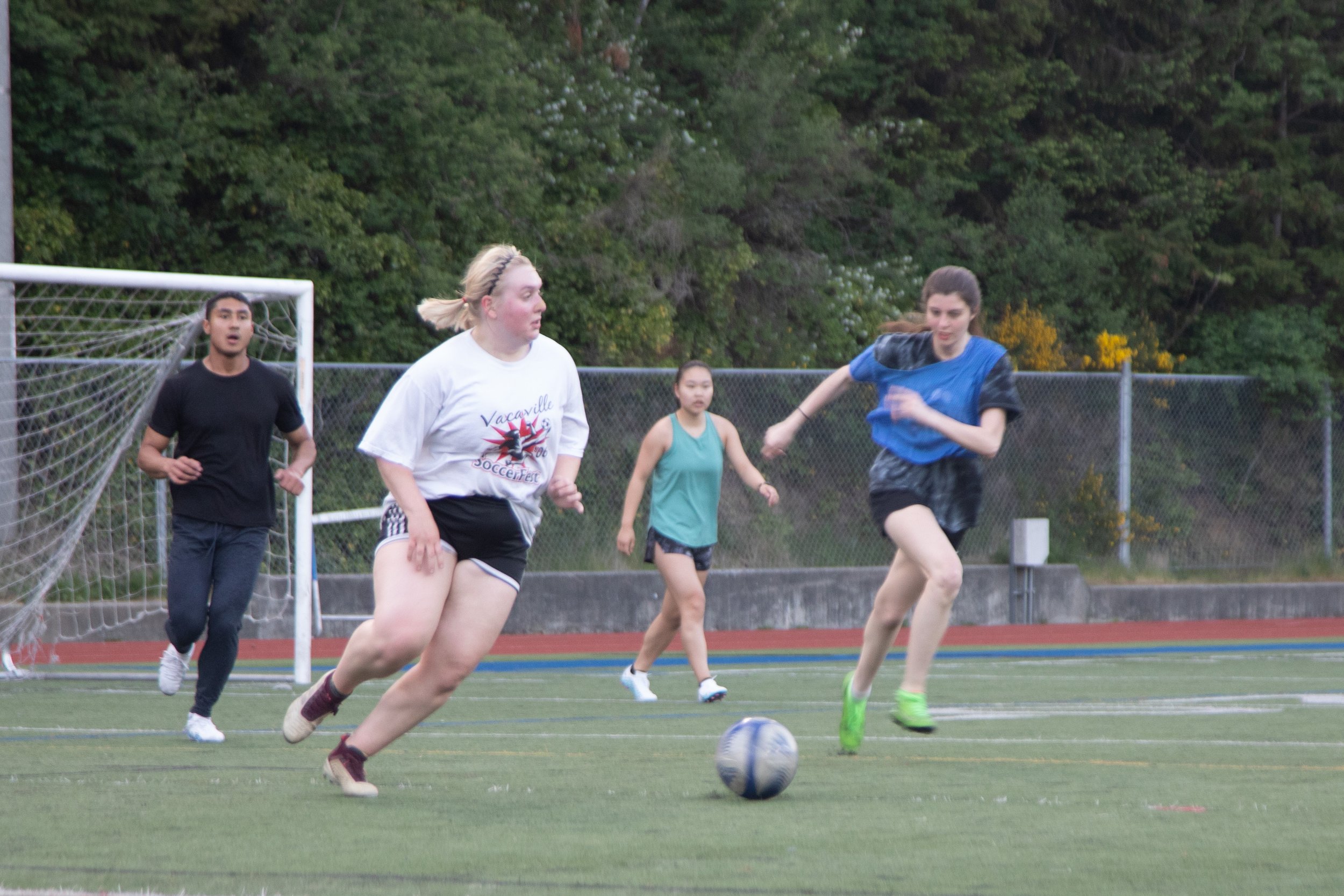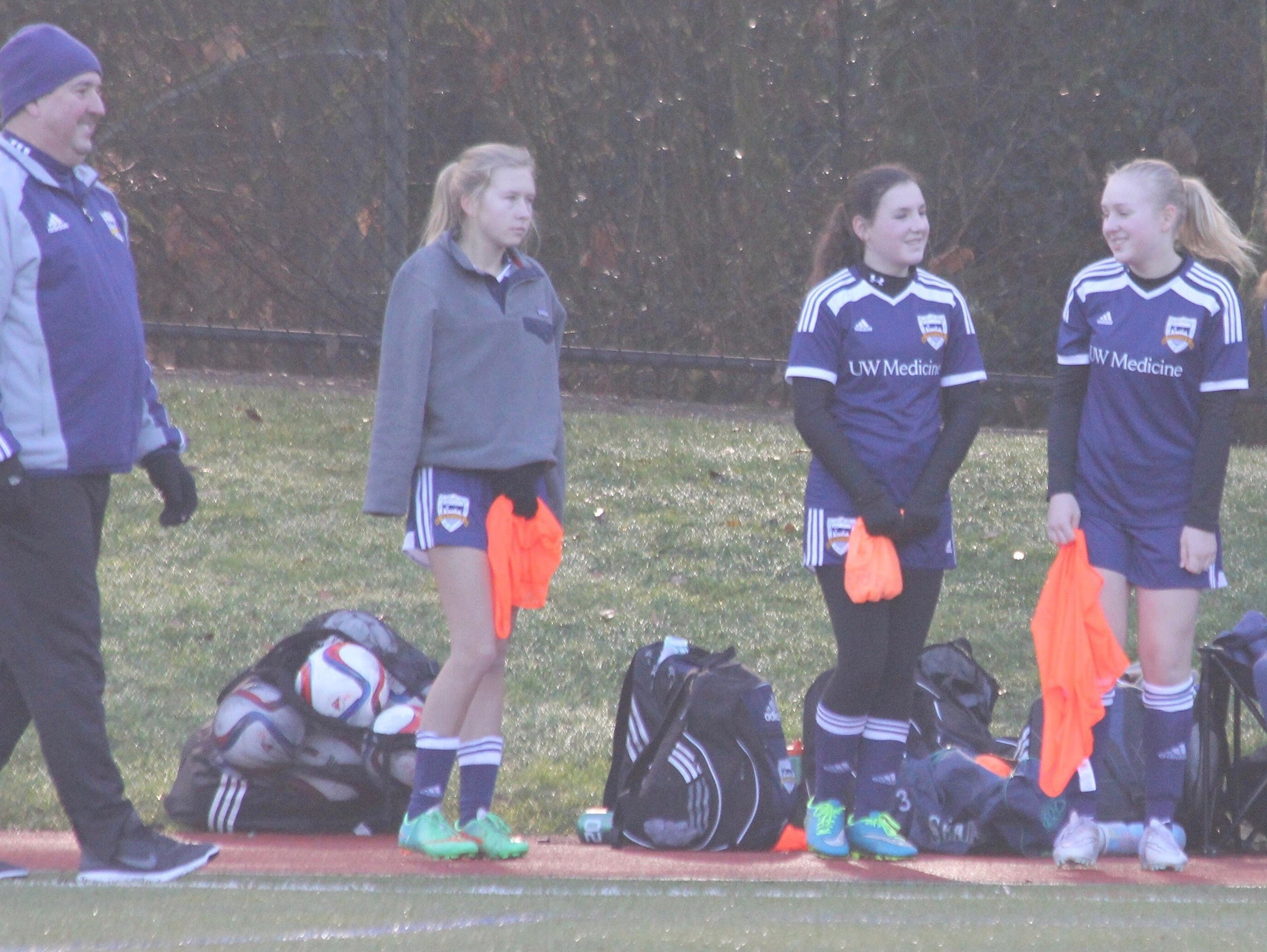Soccer raised me. Then, I abandoned it.
Thoughts from a decommissioned child athlete
Liz McLane prepares to pass the ball at an intramural soccer game on Wednesday, May 17. // Photo by Aislinn Jones
When you wander through your memories, what do you find?
For me, it’s this:
I’m 6 years old. It’s hot in the car. We’re in Yakima for my parents’ annual soccer tournament. I’m eager to watch them play together. Dad’s playing Rush through the speakers, playing air guitar. Mom’s reading in the passenger seat. As we pull into the field’s parking lot, I grab my juice and Annie’s cheddar bunnies, ready to cheer my parents on.
I’m 8. I’m sitting on the grass next to a sideline, wearing my pink spring-season jersey. My fingers are sticky from the halftime oranges and Chewy bars. Mom, in her coach voice, lectures my team about defense skills.
I’m 16. My team has an away game at Oak Harbor High School, so the drive is long. I’m sipping on an AMP energy drink. I get everyone on the bus to scream along to Katy Perry’s “Dark Horse.”
Ask me to think about my childhood memories and a lot of what I come up with is soccer. I played on teams all through elementary, middle and high school. I would play through the freezing cold rain in March and heat waves in the summer. I wore many hats: team captain, bus speaker DJ, and, when I got my license, carpool queen.
And when it wasn’t soccer, it was volleyball. Or skiing. I had a short-lived basketball career, too. I even went through a tennis phase (the best part was my pink racket).
I was an athlete, through and through. Sometimes on a court, or a mountain, but mostly on the field. Soccer was the scaffolding of my youth. Everything — my relationships with family members, my self-esteem, my ideas about fitness and exercise, my approach to friendship, my thoughts on the weather — the beautiful game informed it all.
Standing on the sideline near her dad, Liz prepares to sub in during a game. // Photo courtesy of Liz McLane
Then, about four years ago, my family made the 90-minute drive from Shoreline to Western Washington University in Bellingham. They dropped me off at the Fairhaven dorms, and I started college.
I didn’t join any intramural teams; by the time I knew anyone that played the sports I did, the pandemic had begun and my opportunity was gone. Before school went online, I had visited the Wade King Student Recreation Center a few times with my roommate, Erica. Unfortunately, our typical routine — a 30-minute run on a treadmill followed by a Pinterest-sourced six-pack ab circuit — was just not giving me the same satisfaction as my favorite game.
So, I turned to other stuff. I learned how to make really good banana bread, hosted Zoom movie nights and made collage art in my parent’s backyard. I started taking my first journalism classes online, became obsessed with creative non-fiction books, tried to grow lettuce and failed to eat all of the lettuce I grew.
We all have different “domains” of our identity. I think of them as the building blocks of our personhood. My domains have pulled me in a lot of different directions in my life — I love to cook, write, make art, sea kayak, garden, and yeah, play sports. But when I got to college, I renegotiated my relationships with all of these parts of me, and my identity shifted from being a student-athlete to a journalism student who wanted to spend time identifying plants and reading.
This is a defined phenomenon called identity renegotiation. The concept is highly relevant in the case of student-athletes who discontinue participation upon entering college — a lot of people play sports in high school, but about 94% of high school athletes will not participate at an intercollegiate level. That’s a lot of kids losing a big part of their identity.
In a study done by the Utah State University Families in Sport Lab and the National Collegiate Athletic Association, researchers found that while it’s common to experience a sense of loss upon the transition, the acceptance of a new identity also begins to grow as former athletes transition into a life without competitive sports.
That did happen for me, but it hasn’t been easy. For me, the sense of loss was profound.
The primary driver of this feeling was my experience of a shifting body. My legs, which used to propel me up and down the field and swing hard at the soccer ball, had grown thicker and less toned. My stomach grew, and my chest did too. My hips got wider. My jeans got tight, and it was difficult to even walk up the stairs without becoming out of breath.
It felt so weird, but it was pretty simple — the changes I experienced were the result of my becoming a woman, my genetics, and, of course, the fact that I wasn’t focusing on training my body for competitive sports on a daily basis. It became a hard reality to grasp, and it still is.
So, to learn how to move forward, I began to look more at my past.
As I wandered through my memories again, I found myself in Tukwila, at the Starfire Sports facility. When I was a kid I would sit on the sideline of a field, usually with a coloring book or my math homework, and watch my parents play co-ed adult soccer.
After spending a day working at the library, Mom would run up the stairs to her room, only to come running back down them two minutes later with a big T-shirt, shorts and knee-high soccer socks on. Dad, who would already have packed his gear in the morning, would be ready for us to pick him up at the office on our way to their Tuesday night games. Sometimes I wanted to go and watch them play, but other times I wanted to stay at home with my brother and watch TV.
Liz’s mom and dad stand together with their championship trophies after winning an adult-league tournament in the 1990s. // Photo courtesy of Dave McLane
Whenever I did go, I spent a lot of time alone, watching the game, and thinking about how my parents’ soccer games didn’t look as fun as mine. In my 11-or-12-year-old brain, it wasn’t “real” soccer if there were no Chewy bars at halftime, or if they never practiced together. It wasn’t real soccer if they didn’t have matching uniforms, or if they didn’t keep an accurate score. To me, all of the people my mom and dad played against were old, slow and stinky. I just didn’t really get it.
But, now I do, and I have to laugh at my younger self, just a little.
If anything, the soccer they were playing was the most real stuff around. Pure fun. To my parents, soccer has never been a competition to win, or a means to an end for being in shape. My parents fell in love after they met playing soccer against each other. To them, soccer is love, friendship and family. They let me in on that, and those things will always be a part of my identity. Non-negotiable.
This spring, during my last quarter of college, I found myself returning to the sport I once loved. On Wednesdays, I play six on six intramural soccer with a rag-tag group of friends from my pizza shop job. So far, we’ve lost every game, and I’ve found myself winded after dribbling for even 30 seconds. I’ve learned that I definitely need to buy a new sports bra. Despite all that, I leave the field smiling, every time.
We’re all humans. We’re meant to move, to sweat, to be part of a team. There are a lot of ways to do that, and to do it for joy, love and connection. For me, joyful movement comes in the form of running around the field with my family, my friends, or even strangers. What does it mean to you?



